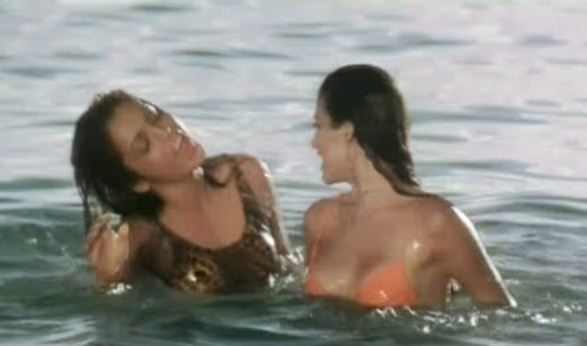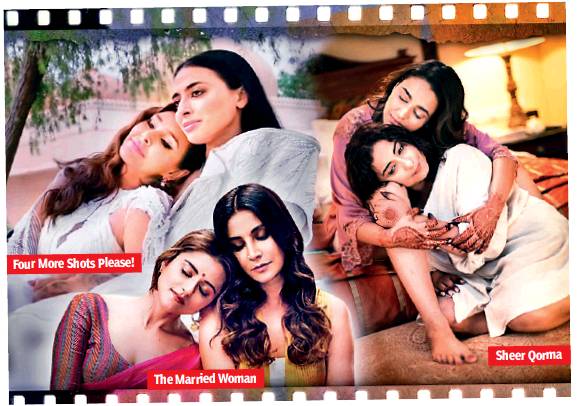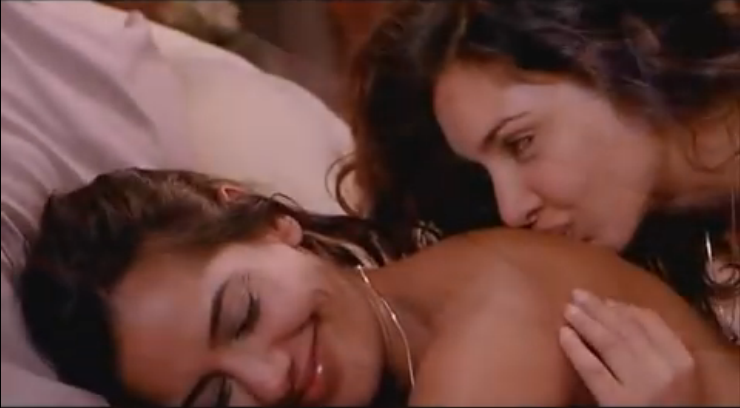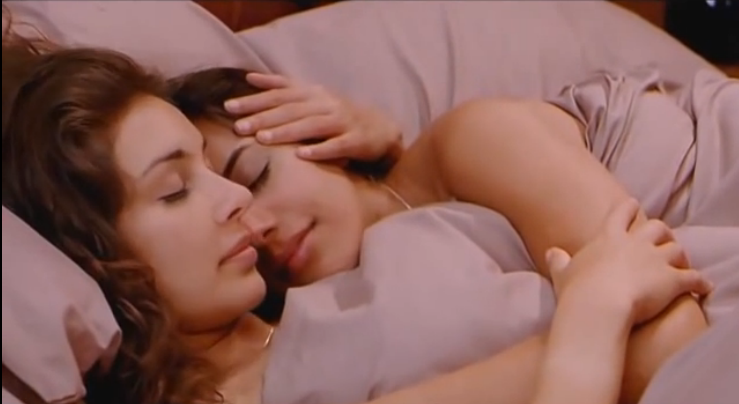Lesbian themes in Hindi-Urdu films
Readers can send additional information, corrections, photographs and even
complete articles on new subjects to our Facebook page Indpaedia.com. If found suitable, this additional information will be incorporated into the Indpaedia article (with an acknowledgement) and new entries will be created (also with due acknowledgement). Readers will be able to edit existing articles and post new articles directly on Indpaedia.com only after its formal launch. |
Contents |
YEAR-WISE
1996-2014
Lesbian themes in Bollywood films
Even homosexuality is gender biased in Bollywood. In the past, there have been films that have screened lesbian love making scenes in Hindi cinema, only to draw the ire of political parties, be it a film like Fire or Girlfriend. But that has not deterred film makers from pursuing the subject. Here's a look at five lesbian scenes from Bollywood films.
Dedh Ishqiya Huma Qureshi and Madhuri Dixit in Dedh Ishqiya- In a brilliant film by Abhishek Chaubey, the film maker explores the theme of homosexuality through the two female protagonists played by Madhuri and Huma. Their love for each other is kept a secret and is revealed much later, a move that takes audiences by surprise. The homosexuality is subtle but obvious and makes the film a pure delight to watch, especially when viewers are under the false impression that the love story is between Arshad-Huma and Madhuri and Naseeruddin. Bravo!
Fire Shabana Azmi and Nandita Das in Fire-The first installment in Deepa Mehta’s elements trilogy, Fire was a bold film, especially when it released (1996). The film was mired in controversy as Shiv Sena protested to the lesbian theme in the film. Fire is a beautiful story of two women who are married to two brothers who neglect them and end up having a relationship with each other, thus exploring their sexuality. Both Shabana Azmi and Nandita Das did an exceptional job with the film, but perhaps the time was not right as maybe cine goers and people in power were not ready for such a bold themed film.
Girlfriend Amrita Arora and Isha Koppikar in Girlfriend- When the Amrita Arora and Isha Koppikar starrer film Girlfriend released in 2004, it got embroiled in controversy for its bold content. The movie explored the theme of alternate sexuality where the two women protagonist end up having feelings for each other. Both Isha and Amrita received flak for doing such a film as that time, Bollywood and viewers were still opening up to the theme of sexuality, something that was not exploited too much on the silver screen.
Heroine Kareena Kapoor and Shahana Goswami in Heroine- Kareena Kapoor’s Heroine may have bombed at the Box Office, but director Madhur Bhandarkar went a step ahead to explore the theme of lesbianism, albeit subtly in the film. In a scene where Kareena and Shahana Goswami are having a spend over at the latter’s place in the film, Shahana leads Bebo to the bedroom, a scene that implies the two have had a one night stand. Madhur Bhandarkar has done this cleverly in a bid to avoid any controversy for his film. Surprisingly, a mainstream actress like Kareena Kapoor Khan agreed to do this scene in the film.
Ragini MMS 2 Sandhya Mridul and Sunny Leone in Ragini MMS 2- Balaji Telefilms’ and ALT Entertainment’s Ragini MMS 2, a sequel to Ragini MMS are leaving no stone unturned to ensure their film grabs eyeballs. And literally so! Starring Sunny Leone and Sandhya Mridul, there is a passionate kiss between the two female protagonists of the film. While this may be the requirement of the script and a minor diversion in the film’s subject, it has to be included in our list.
2021
It’s been 25 years since Deepa Mehta made Fire, India’s first mainstream same-sex story. But it’s only now that queer women are getting their space on screen
A female bank employee finds herself irresistibly drawn to a woman who sings jazz at a pub in Mumbai. A closeted student confesses to her best friend that she’s finally found someone she likes — another girl on their campus in Jaipur. Two women, a gym trainer and a film star, walk down the aisle in Udaipur in the presence of friends. A married woman begins a clandestine affair with her late colleague’s widow in Delhi. A queer woman and non-binary person seek acceptance from their families.
These storylines from recent films (Sheer Qorma) and web shows (Bombay Begums, Mismatched, Four More Shots Please! and The Married Woman) show how much screen portrayals of queer women have evolved, reflecting not just the hurdles of same-sex relationships but also the fun, the romance and heck, even the ordinariness of it all. Not surprising since many of them have LGBTQ writers and filmmakers at the helm.
Director Faraz Arif Ansari, whose latest film Sheer Qorma stars Swara Bhasker and Divya Dutta as a couple, recalls being asked why they chose to make a film about queer men and not women during a screening of their debut Sisak. “It got me thinking ‘Where are the queer women?” says Ansari, who is non-binary. Ansari adds that the film hopes “to open a deeper dialogue about love and acceptance, especially in South Asian communities across the world”.
Shohini Ghosh, media professor at Jamia Millia Islamia, says it’s just the beginning and as the idea of same-sex love becomes more acceptable in society, queer sexuality will become more visible on screen. “I think the exciting process has begun and will continue,” she says, giving the example of the 2019 queer romance Ek Ladki Ko Dekha Toh Aisa Laga. “When the star body, in this case Sonam Kapoor’s, embraces queer sexuality it becomes a powerful statement in itself,” she says. “It is a delight to see a whole new generation of women, like Bani J and Lisa Ray for example, who are comfortable and uninhibited about playing queer roles.”
So why has it taken so long, though there were subtle hints at lesbian love in Dedh Ishqiya? After all, it’s been 25 years since Fire introduced a lesbian love story to mainstream audiences for the first time in 1996. Writer Apurva Asrani, who has worked on Aligarh and Made in Heaven which had queer men in lead roles, says that it simply boils down to the fact that the dominant voice continues to be that of men. “Women’s voices are muffled in our society, so even within the LGBTQ scene and pride marches, the representation for women is lesser than that of men,” he says. “Maybe that’s why we haven’t had many stories out there.”
Ansari says that when they reached out to producers for Sheer Qorma, they were told to change the lead characters of the queer woman and non-binary individual to men. “I was even told to cast ‘hot, muscular, fair men’ and I would have the required investment,” they say. “Misogyny is real and runs deeper than you and I can imagine.”
But some of that’s changing, and Ghosh credits the blossoming of queer romance to the hard work of activists. “In the early 1990s, none of us would have guessed that queer sexuality would find such wide acceptance. To a very great extent the activism of the LGBTQI community has been responsible for this.”
Gazal Dhaliwal, a trans woman who wrote Ek Ladki Ko Dekha Toh Aisa Laga and Mismatched, says the reading down of section 377 in 2018 has given creators more freedom. “Earlier, there was an inhibition because the very act of loving someone from the same sex was a crime but that is not there anymore. I see more people coming out and owning their identities so there are more stories both on and off screen.”
There has also been a rise in the number of queer women like Dhaliwal in the television and film industries. Dhaliwal says it is important to give space to queer creators to tell their stories, and create nuanced characters rather than caricatures. For instance, while adapting a rom-com novel into the Netflix series Mismatched, she consciously stayed away from clichés. “We wanted to flip the cliche of the female lead’s gay male best friend by having a male protagonist with a female gay best friend,” she says. “She’s also a regular girlnext-door who falls in love with a character who isn’t gay.”
Asrani feels it’s important to have queer creators if you want to tell a story sensitively. “Otherwise it is like mansplaining,” says Asrani, adding that “the Hindi film industry is one of the gayest and also very closeted film industries and to find queer writers and filmmakers is actually very easy.”
Sulagna Chatterjee, 24, is a queer screenwriter who has penned slice-of-life same-sex romances such as Firsts on YouTube and the forthcoming short film Feels Like Ishq on Netflix. “I wanted to tell love stories that our community can relate to,” she says. “Growing up, I barely had such content. There were stories of discrimination, pain and the hard side of accepting our sexuality but we deserve to have our sappy romances to watch with our partners too.” Firsts follows the relationship of a young lesbian couple who move in together soon after they start dating, and explores the themes of coming out and being in a relationship for the first time. “Many queer women said it was an inside joke, since we are known to jump into relationships,” she says. Feels Like Ishq is also about navigating romance and youth. “Often sexuality is used as a plot point to drive the story, but queer people have lives that are not just defined by their sexuality,” she says.
However, filmmaker Onir, whose next film We Are celebrates gay, lesbian, trans and bisexual love stories, feels that on-screen representation still amounts to tokenism “which keeps a heteronormative audience comfortable”. Ansari agrees. “The whole increase in queer content has not really been about representation but about cishet people (a heterosexual person who identifies as the gender they were born with) using their inauthentic, tokenism to tell queer narratives.” Ansari says it’s time to put the spotlight on queer makers. “Let us tell our stories. Like I keep saying, move, cis!”
Chatterjee says even LGBTQ stories need to go a step further. “We need to talk about gender fluidity, asexuality, trans lives. Our spectrum shouldn’t be about just men loving men and women loving women.”
Diaspora cinema
Even Fire was a diaspora film, having been directed by an Indian-Canadian.
The World Unseen (2007/South Africa | UK/ English) (Directed by Shamim Sarif and produced by Hanan Kattan): Miriam is married to Omar (Parvin Dabas) and has children. yet she has a lesbian affair with Amina in apartheid-era South Africa
I Can't Think Straight (2008/UK/ English) (Directed by Shamim Sarif and produced by Hanan Kattan Lisa Ray and Sheetal Sheth kiss and make love more than once in the film. Tala is a Jordanian woman about to get married. Leyla is of Indian origin living in London. she is dating Tala's best friend Ali. But they discover true love in each other. In the film’s brilliantly hilarious last scene two British women comment on the lesbian couple. ‘She’s what?’ asks one. The other woman, obviously somewhat hard of hearing, replies, ‘But some of my best friends are Lebanese.’
See also
Adult content in Bengali cinema Adult content in Hindi-Urdu cinema Adult content in Kannada cinema Adult content in Malayalam cinema Lesbian themes in Bengali films Lesbian themes in Hindi-Urdu films Lesbian themes in Malayalam cinema








